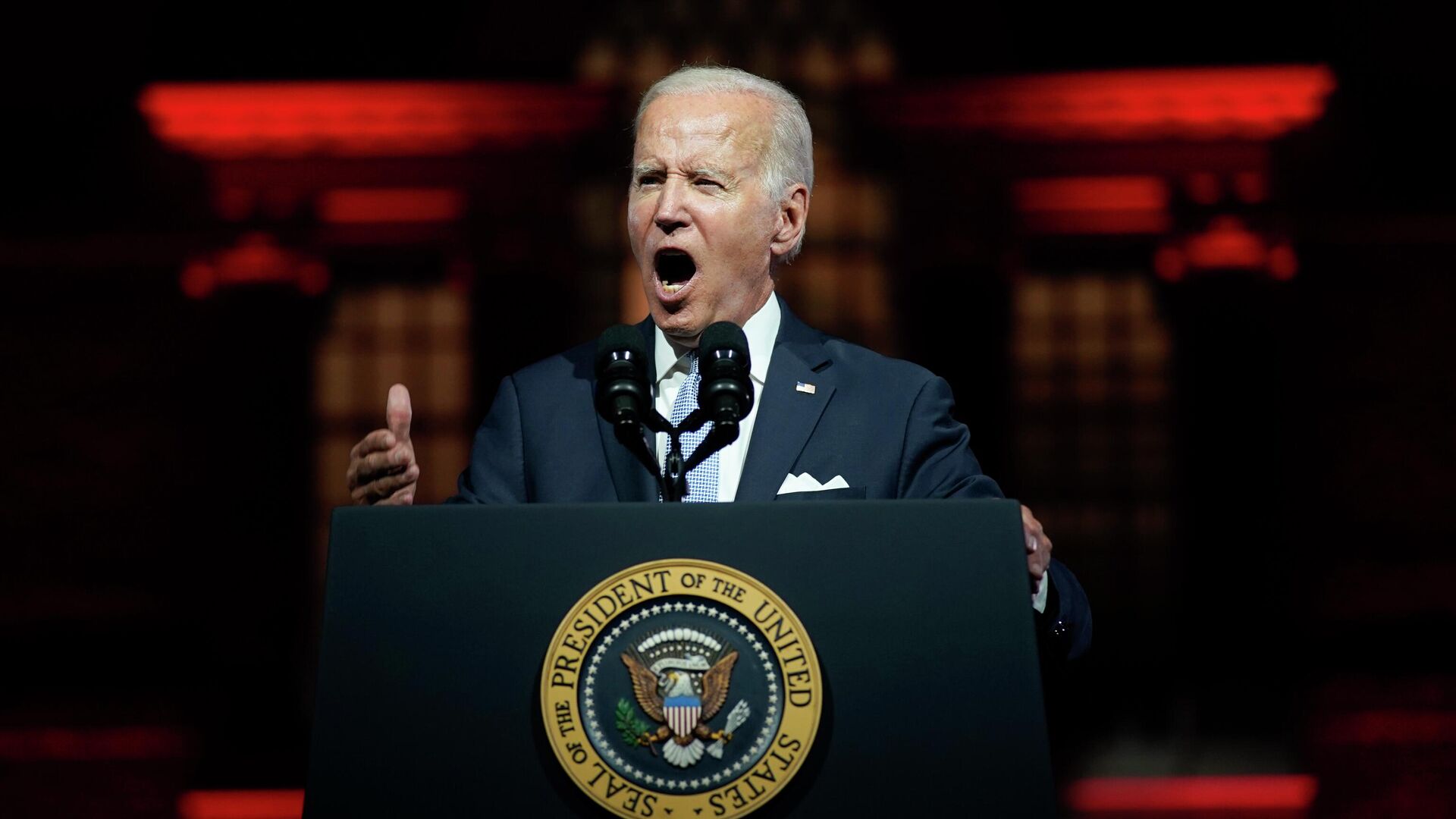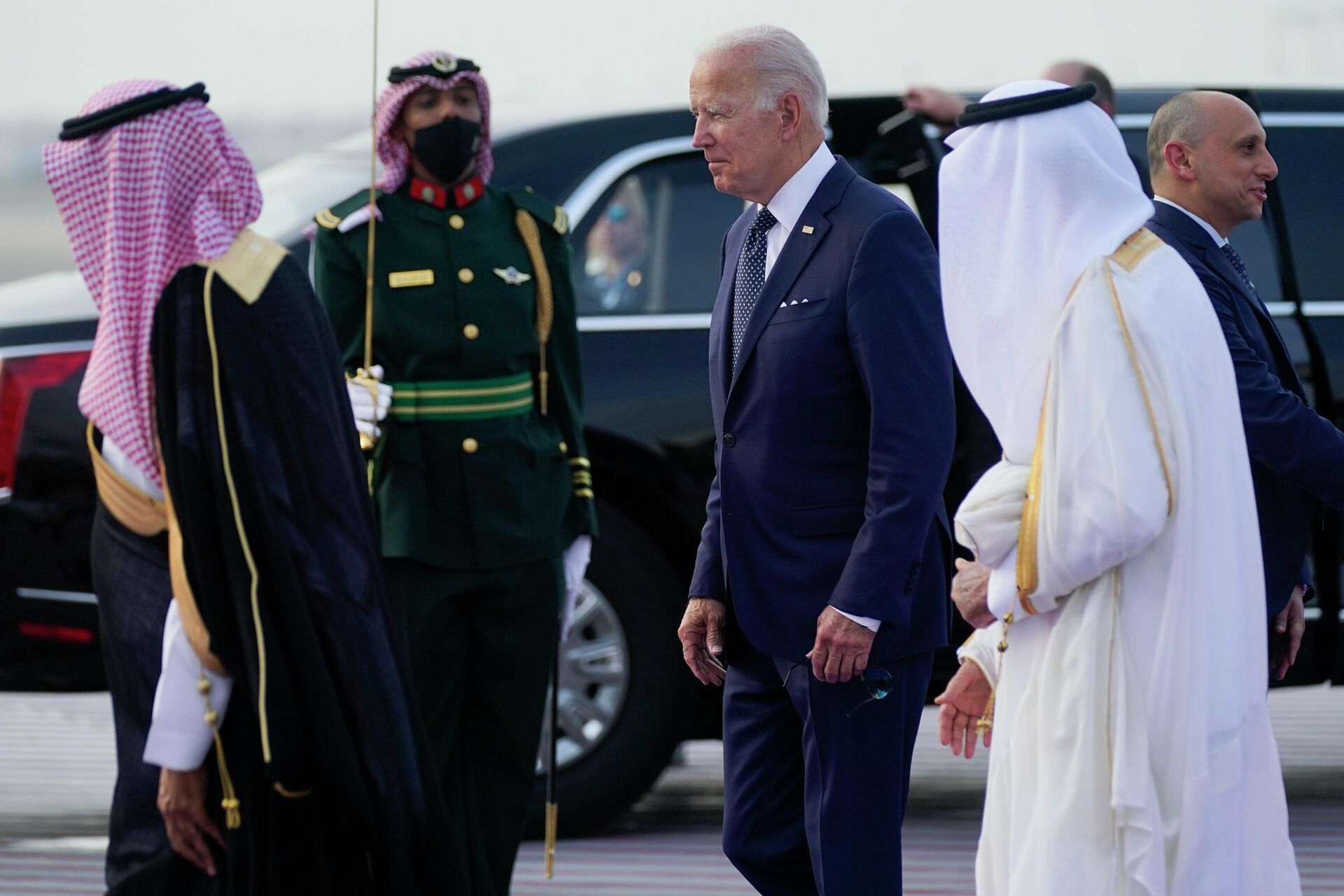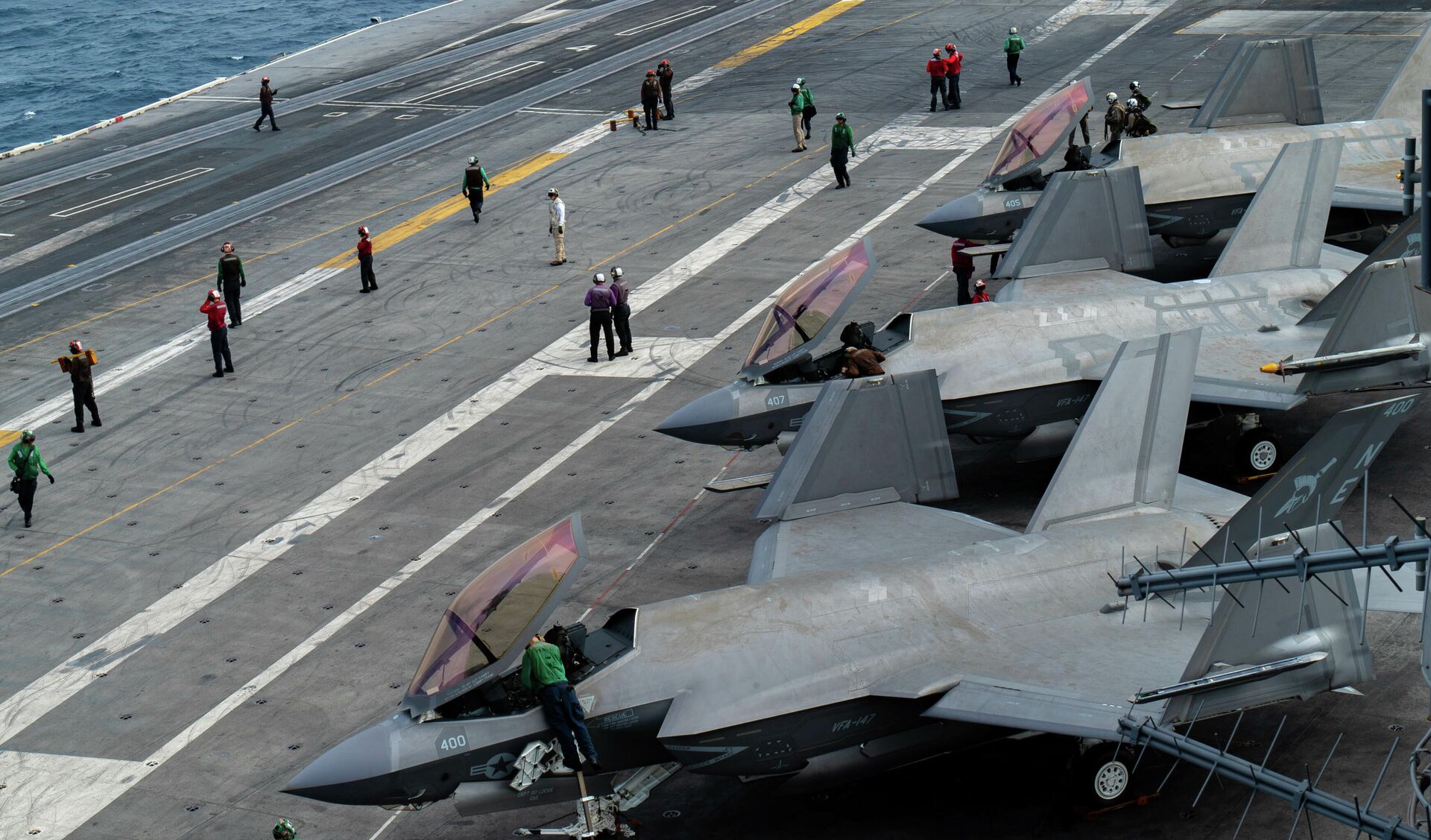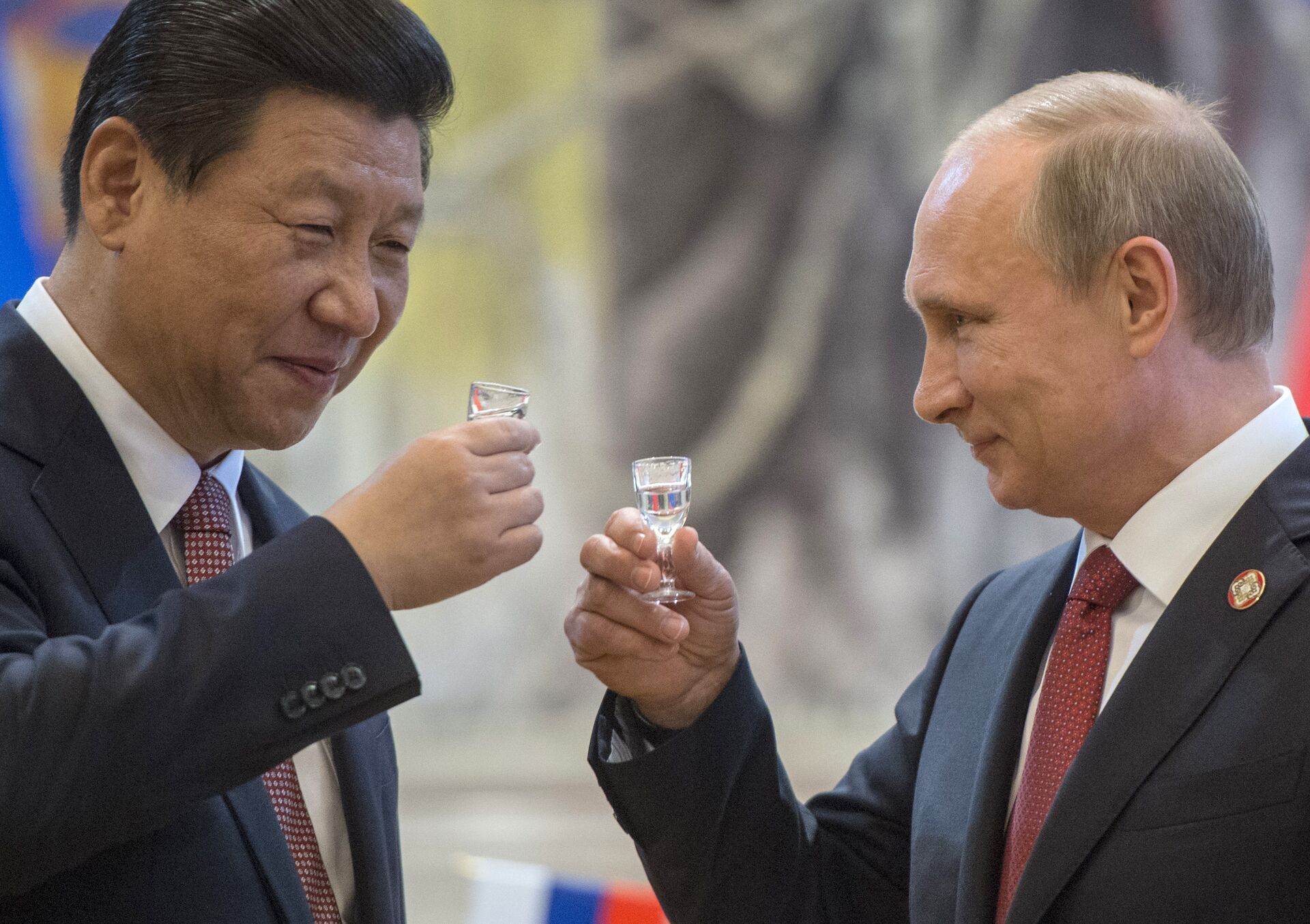‘Political Hit Document’: US Security Strategy a ‘Psychological Projection’ of Problems Onto Rivals

© AP Photo / Evan Vucci
Subscribe
While US President Joe Biden has sought to differentiate his administration from that of his predecessor, Donald Trump, experts have pointed out the numerous continuities in policy, most especially in foreign policy, where the US’ “official enemies” remain the same, as do the methods of fighting them.
When the Biden administration released its new National Security Strategy (NSS) earlier this week, it was roundly criticized by academics. The Quincy Institute for Responsible Statecraft called it “strikingly schizophrenic,” noting it bounces between pledges to lead global cooperation and declarations that the world is divided into intractable rivalries.
It was the first such document to be issued since 2017, when the Trump administration first said it saw “great power competition,” not international terrorism, as the US’ primary strategic challenge and focus. While Biden’s NSS affirms that conclusion, it also says the US “will avoid the temptation to view the world solely through a competitive lens, and engage countries on their own terms.”
Larry Johnson, retired CIA intelligence officer and State Department official, told Sputnik on Thursday that “there’s just such an enormous disconnect” between reality and what’s reflected in the White House document.
“It's not even data driven. It's not based on facts. It's based on ideology. It's based on preconceived notions,” he said.
“[T]hey make a series of assertions about Russia, for example, that Russia is an imperialist power. Well, anybody that has certainly looked at the history of the last 30 years would note that the only country that has been invading other countries, the only country that has been sending its military forces to try to force its will on other countries has been the United States, not Russia. Yet the Biden administration declares that Russia is an imperialist power. It declares that Russia invaded the Donbass in 2014, which is just an absolute lie. It's actually not true.”
“So it goes to a series of, I call them ‘psychological projections,’ indicating that in Russia there is no freedom of the press, everything is controlled by the government and political opposition is persecuted. Well, that's exactly what's going on in the United States. They are literally describing the state of affairs in the United States, of the use of the FBI to go out and arrest and harass political opponents of Joe Biden. So all of this is just examples of how misguided and off base this national security strategy is. It's not really a national security strategy. It's just that I would call it ‘a political hit document.’”
Johnson said the US has “no consistent theory or strategy” guiding its actions, “it is simply trying to bully others. And if you don't do what the United States wants, they're going to threaten you with sanctions and try to hurt you.” But a growing number of countries are telling the US “nyet.”

President Joe Biden arrives at King Abdulaziz International Airport
© AP Photo / Evan Vucci
“We saw that with respect to OPEC. The United States was pressuring Saudi Arabia and really trying to get the Saudis to interfere in the US domestic election by withholding price increases until after the elections. Well, the Saudis said, ‘no, we're going to act in our own best economic interests.’ And for that, then, the United States is now threatening to cut off weapon supplies and aid to the Saudis.”
“What is so ironic about this is that the United States is really not in a position to make those kinds of threats. It's not like the United States is the only country in the world that sells weapons. In fact, it's increasingly clear that Saudi Arabia could buy the advanced weaponry it needs from Russia and actually get it at a far cheaper, you know, less expensive and more effective. So, there's just such an enormous disconnect between the reality that's reflected in that document.”
Rather, Johnson said the NSS is “designed entirely to provoke fear,” which the US leadership feels will be adequate to rally support. He noted the repeatedly invoked threat of nuclear Armageddon, and how such tensions lead to “funneling money to the major defense contractors.”
“This has much more to do with the economics of a failing industrial state than it does with the actual military strategy and doctrine,” he pointed out.
The US especially cannot afford the kind of competition with China that the NSS lays out. Noting that the US has already “grossly overextended itself,” Johnson compared the situation to the Soviet war in Afghanistan, in which the expenses of war played a significant role in leading to the breakup of the country in 1991.
“The United States is now facing some real headwinds, some real problems economically. And it is no longer in a position as it was back in, say, 1940-41, where it had a unique industrial power, it was self-sufficient. It could manufacture. It didn't necessarily depend upon foreign exports. That's no longer the case. So, the United States is dependent in many respects on China for essential minerals and essential products and everything up to and including computer chips. So, when you're dependent upon somebody like that, you're not able to act independently of them.”

Three F-35C Joint Strike Fighters on the USS Carl Vinson in the South China Sea on January 14, 2022.
Dr Matthew Crosston, Professor of National Security and Director of Academic Transformation at Bowie State University, told Sputnik that the NSS’ haphazard construction is “simply a reflection of what happens when you try to pin long-term strategy to a present-day, ever-changing conflict in another land.”
“Please remember that the NSS was originally scheduled to be released late last year. It was the build-up to conflict between Russia and Ukraine that forced the US to postpone its release, so convinced was Washington that how that conflict proceeded would fundamentally alter and change the NSS,” Crosston said.
“The only thing that remains constant, in my opinion, in any version of the NSS is that the main threats needing to be deterred are China and Russia. Details will be ‘to be determined’, which also increases the sense of schizophrenia. America is happy because it feels it finally has its ‘enemies’ well-defined, but it is unhappy because it is still a bit confused as to how to deal with these new categorizations,” he said.
However, Crosston didn’t agree that the NSS was as contradictory as it seems at first glance.
“America can accuse Russia of being that ‘persistent threat’ while simultaneously declaring it has no desire for strategic competition and confrontation because it simply wants to see Russia isolated and removed from the global order of recognition and legitimacy,” he pointed out. “If Russia can be renamed and recategorized as a total pariah state, then America will feel justified in declaring Russia a permanent threat AND think of itself as a force for good that is peace-loving and peace-enforcing. The mistake being made by analysts is not recognizing that hidden subtext of making Russia an outcast in the international system.”
That said, he noted that such documents, and the political rhetoric they parallel, is more aimed at the US domestic audience and “nervous” US allies than it is for “relevant political actors in Moscow.”
“What Washington says at the microphone, about Russia, is not what Russia needs to pay attention to. It must instead focus on what conversations are being initiated away from the microphone,” he said. “That is where opportunity will be.”

May 21, 2014. President Vladimir Putin, right, and Chinese leader Xi Jinping after the signing of joint agreements in Shanghai
© Sputnik / Sergey Guneev
/ The biggest opportunity that Crosston saw was for Moscow to grow closer to Beijing - something Washington clearly hopes to avoid, as the NSS’ disjointed labels for Russia and China shows.
“America has over the last two decades become quite comfortable with the ‘competition’ that exists with China because the global economy is so intertwined with Chinese manufacturing and American consumption that it almost precludes any real conflict from emerging between the two countries. It would be too self-injurious to both,” he said. “The wild card, to America, is Russia inserting itself into this dynamic so instead of dyadic it becomes triadic. This is what America truly fears and fights to avoid.”
“If Russia really wants to upset America and make America ‘uncomfortable’ and unable to act internationally with impunity (this is the common criticism Russia levels against the United States), then it needs to do everything and anything it can to solidify and unify its relationship with China, operating on an axis that is founded [on] limiting American power.”

